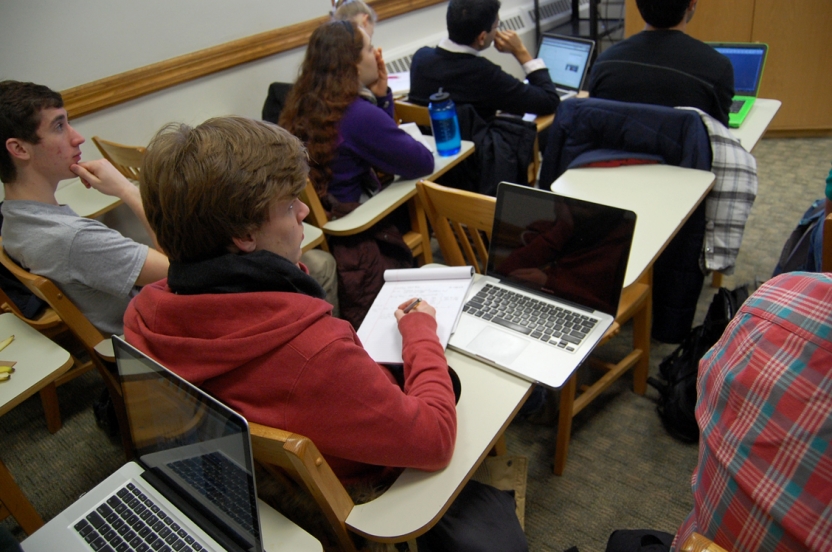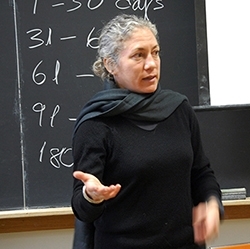Students Focus on a Single Subject during Winter Term

MIDDLEBURY, Vt. — Students returned to campus on Monday, January 6, for the four-week Winter Term that is both an integral component of the curriculum and a Middlebury College tradition dating back to 1969.
Most students have registered for one of the 125 faculty-led courses, while many others will be pursuing independent projects or internships with college approval. During Winter Term each student may enroll in only one credit-bearing course, and all courses typically meet for a minimum of eight contact hours per week. First-year students are required to be on campus for Winter Term, while sophomores, juniors and seniors may study at Middlebury or elsewhere.
Winter Term is designed to be an intensive and memorable learning experience.
“It is a time for students and faculty to engage academic topics that are not typically offered in our regular semester curriculum,” said Robert Cluss, dean of curriculum and professor of biology. “Students focus their energy and attention on a single course, and this immersive experience invites new opportunities for learning.”
Some of the courses led by Middlebury College faculty during the 2014 Winter Term include: Introduction to Swahili and East African Culture with Michael Sheridan, associate professor of anthropology; Designing a Field House Museum for Middlebury College with Holly Allen, assistant professor of American studies; and Understanding Uncertainty: Exploring Data Using Randomization with John Emerson, Dana professor of mathematics.
Also, Musicianship with Jeffrey Buettner, associate professor of music; Graphical User Interface Applications in C++/Qt with Frank Swenton, associate professor of computer science; Trade and Foreign Aid in Latin America with John Maluccio, associate professor of economics; and The Elements of Murder with James Larrabee, Kenan professor of chemistry.

Elizabeth Toder, a visiting instructor and 1990 Middlebury graduate, is back to teach Extending Financial Services to the Unbanked.
A significant number of visiting instructors are invited to Middlebury every winter to offer courses that extend beyond the range of the academic-year faculty.
Orville Schell, the former dean of the Graduate School of Journalism at UC-Berkeley, is teaching The China Boom: The Historical Routes of China’s Current Economic Dynamism. Schell is currently director of the Center on US-China Relations at the Asia Society in New York.
In addition, Andy Hale, Class of 2006, a teaching fellow at Harvard Medical School and a resident in internal medicine at Beth Israel Deaconess Medical Center, is offering Infectious Disease: Historical Epidemics, Current Dilemmas and Emerging Problems; movement artist and choreographer Tiffany Rhynard is conducting the course Move2Change: Social Activism and Performance; and federal prosecutor James Gelber, an attorney who spent 15 months counseling judges and prosecutors in Afghanistan, is offering Afghan Legal and Political History.
All Winter Term courses must be approved by the Curriculum Committee, and enrollment is generally limited to 22 students or fewer. Winter term courses are graded on an A to F basis just like other for-credit classes at the college.
Commonly known as “J-term,” the Winter Term at Middlebury was first recommended by the Faculty Educational Policy Committee in February 1968 as part of a major revision to the curriculum. Up to that time, students enrolled in five courses per semester and the fall semester lasted until mid- to late-January. The 1968 faculty voted 69 to 29 to install the proposed 4-1-4 curriculum that following fall, and Winter Term has been a part of the Middlebury experience ever since.

